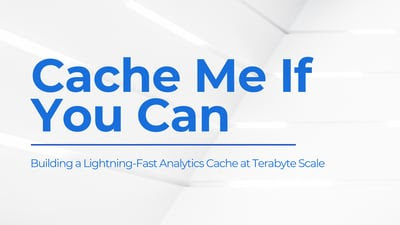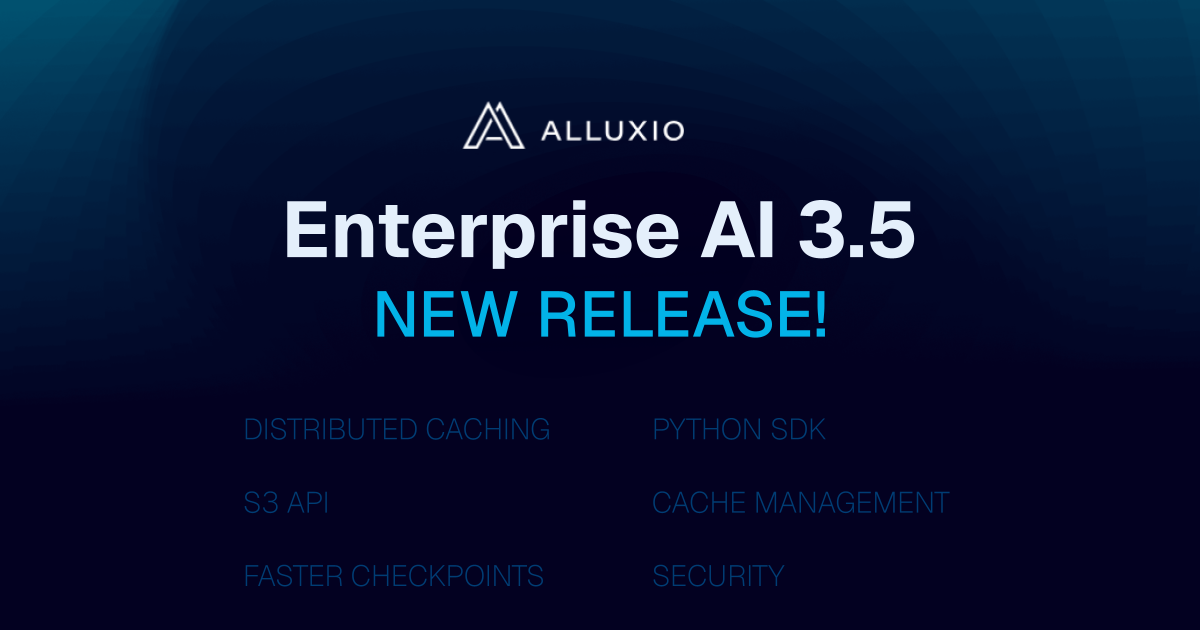Blog

Suresh Kumar Veerapathiran and Anudeep Kumar, engineering leaders at Uptycs, recently shared their experience of evolving their data platform and analytics architecture to power analytics through a generative AI interface. In their post on Medium titled Cache Me If You Can: Building a Lightning-Fast Analytics Cache at Terabyte Scale, Veerapathiran and Kumar provide detailed insights into the challenges they faced (and how they solved them) scaling their analytics solution that collects and reports on terabytes of telemetry data per day as part of Uptycs Cloud-Native Application Protection Platform (CNAPP) solutions.

With the new year comes new features in Alluxio Enterprise AI! Just weeks into 2025 and we are already bringing you exciting new features to better manage, scale, and secure your AI data with Alluxio. From advanced cache management and improved write performance to our Python SDK and S3 API enhancements, our latest release of Alluxio Enterprise AI delivers more power and performance to your AI workloads. Without further ado, let’s dig into the details.
.png)
.jpeg)
In this blog, we provide an overview of Alluxio's AI/ML model training solution. For more details about the reference architecture and benchmarking results, please refer to the full length whitepaper.

As more organizations advance their data revolution strategy, and run more diverse workloads on a wider variety of platforms across clouds and hybrid clouds, 2022 will see even more advances in AI, machine learning and analytic workloads and technologies and services to support them.
.jpeg)
Metadata synchronization (sync) is a core feature in Alluxio that keeps files and directories consistent with their source of truth in under storage systems, thus making it simple for users to reason the data retrieved from Alluxio. Meanwhile, understanding the internal process is important in order to tune the performance. This article describes the design and the implementation in Alluxio to keep metadata synchronized.
.jpeg)
.jpeg)
Alluxio is the data orchestration platform to unify data silos across heterogeneous environments. The following blog will discuss the architecture combining Spark with Alluxio.

Unisound is an artificial intelligence company focusing on Internet of Things services. Unisound’s AI technology stacks include the perception and expression capabilities of signals, voices, images, and texts, and the cognitive technologies such as knowledge, understanding, analysis, and decision-making, towards a multi-modal AI system. Atlas is the supercomputing platform supporting all kinds of AI applications including model training and reasoning inferencing.
.jpeg)
This blog is the first in a series introducing Alluxio as the data platform to unify data silos across heterogeneous environments. The next blog will include insights from PrestoDB committer Beinan Wang to uncover the value for analytics use cases, specifically with PrestoDB as the compute engine.
.jpeg)
Alluxio 2.6 significantly improves the performance of data-intensive AI/ML workloads across any storage, and also improves the general maintainability and visibility of Alluxio clusters, especially for large-scale deployments. We have taken the feedback and contributions from the community and introduced features which simplify deployment, introduce new data management capabilities, optimize performance, and provide enhanced visibility into system behavior.

Alluxio 2.5 focuses on improving interface support to broaden the set of data driven applications which can benefit from data orchestration. The POSIX and S3 client interfaces have greatly improved in performance and functionality as a result of the widespread usage and demand from AI/ML workloads and system administration needs. Alluxio is rapidly evolving to meet the needs of enterprises that are deploying it as a key component of their AI/ML stacks.
.jpeg)
Data processing is increasingly making use of NVIDIA computing for massive parallelism. Advancements in accelerated compute mean that access to storage must also be quicker, whether in analytics, artificial intelligence (AI), or machine learning (ML) pipelines.
.jpeg)
This post outlines a solution for building a hybrid data lake with Alluxio to leverage analytics and AI on Amazon Web Services (AWS) alongside a multi-petabyte on-premises data lake. Alluxio’s solution is called “zero-copy” hybrid cloud, indicating a cloud migration approach without first copying data to Amazon Simple Storage Service (Amazon S3).

.png)
.jpeg)